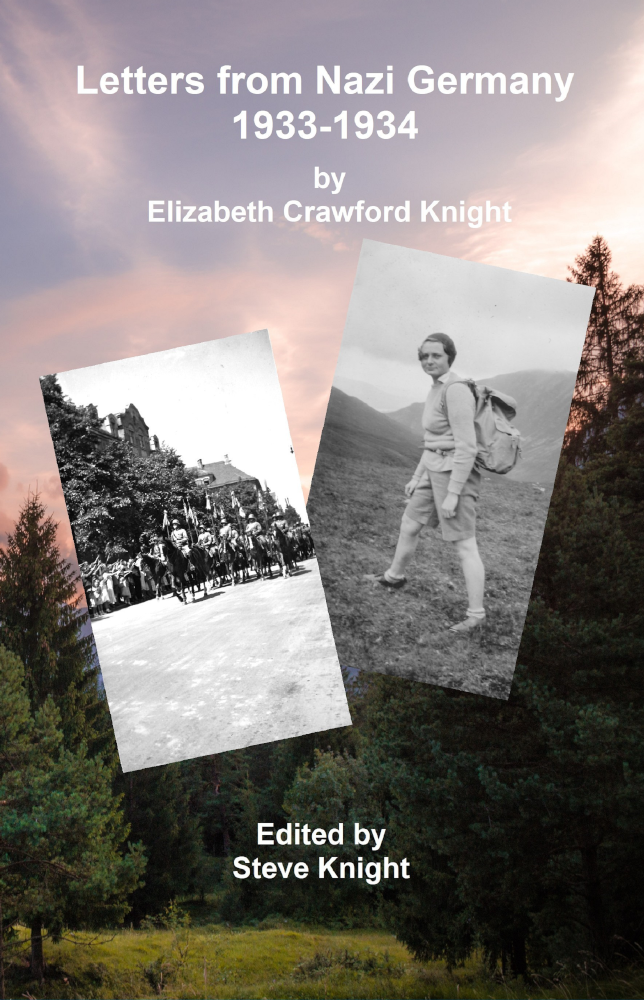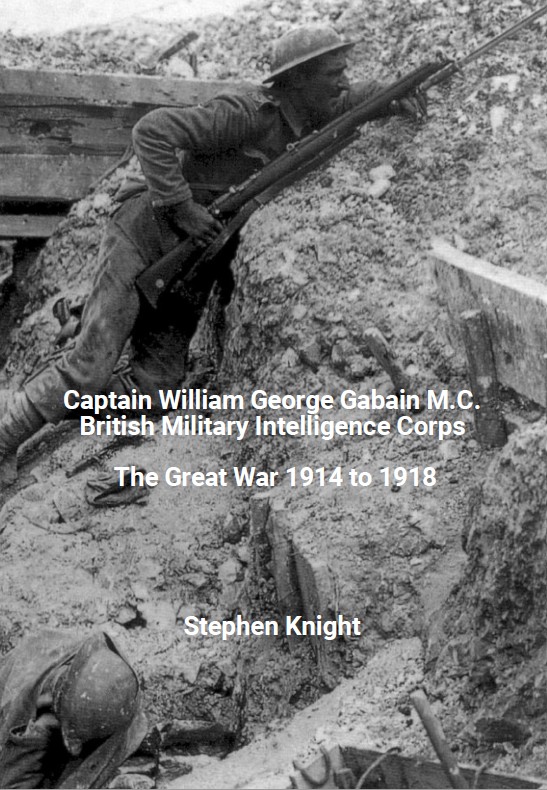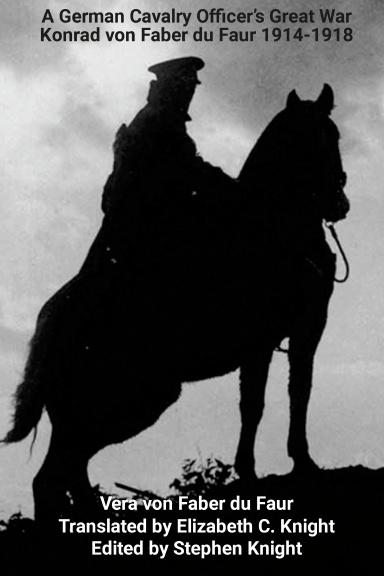From
Kellscraft Studio Publishing:
Books Edited and Written by
Stephen Knight
Letters from Nazi Germany
1933-1934
Elizabeth C. Knight
Edited by Stephen Knight
Skowhegan, ME: Kellscraft Studio
2023

"These letters reflect the feelings and experiences of a 19-20
year old woman. It was not her first journey to Europe, but it was her
first time living in Germany. The rise of Hitler and the Nazi Party to
power in January, 1933 raised many questions for her, especially after
the Night of the Long Knives, when Hitler eliminated Ernst Rohm of the
Brownshirts, the Chancellor Kurt von Schleicher, and many of the SA.
She knew many young men in the SA. As you will read in her letters, she
thought Hitler was right to attack Rohm, but she also saw the horror of
the killings, especially when the head of the student organization,
whom she knew, was murdered and found in a ditch. She was also aware of
the Dachau Concentration Camp, although its true horrors were not known
until years later. She was angered when three of her favorite opera
singers were removed from performing because they were Jewish. She
witnessed Nazi marches, saw the Nazi flags on almost all buildings,
heard some professors denigrate Americans, and commented on the
increased militarization of the society. These events were a lot for a
nineteen year old to absorb."
--Introduction, by Stephen Knight
Elizabeth (Libby) Crawford was born in 1914, and was just nineteen when
in August, 1933 she left Vassar for a junior year abroad in Germany.
Hitler had come to power in January, and she witnessed the growth of
totalitarian rule in the country. The dictatorship impacted the
university, the performance arts, life on the streets, and how people
understood they needed to be careful in what they said. Soldiers and
Nazi flags seemed to be everywhere. Her
year started with a journey by boat across to Hamburg, and then for
extensive language training in Bonn before moving on to Munich. She
lived with the von Faber du Faur family, who had seen the loss of their
wealth in the hyper-inflation of the early 1920’s. They disliked the
Nazis but also feared chaos. The full horror of what was to come for
Germany and the world lay in the future. Many of the young men she got
to know were members of the SA and supported Hitler.
Libby bought a bicycle to use in Munich and for trips around the
countryside. She skied in the Bavarian Alps, traveled to Austria, Italy
and Hungary, and sent a regular flow of letters home to her parents and
sister. Her studies included extensive readings
in German literature, and she attended many operas and plays. She
enjoyed an active social life, living for the first time without the
Prohibition in the USA. Later in life she translated the E.T.A. Hoffman
novel, Kate Muir, and a book by Vera von Faber du Faur. This book told
of her brother’s experiences in the Great War and his death in Russia.
She returned to Vassar in the fall of 1934, and earned a PH.D in German
literature in 1938 from Yale University. Libby made a number of trips
back to Europe in the 1930’s, including a bicycle trip in 1937 which
started in Hamburg, and included visits to Berlin and Prague,
Czechoslovakia. These letters reveal how a young
woman learned directly about the rise of a totalitarian government.
What she witnessed determined how she saw the world for the rest of her
life. She tells the story with humor and candor. Libby was extremely
independent and courageous in her travels, an approach to life she
passed on to her children.
Some excerpts from the book:
|
"July 1, 1934
Dear Mummy,
I'll have to tell you about all the excitement. Of
course you will read all about it in the papers, but they may have
exaggerated a lot and if they have said anything against Hitler don't
you dare believe it.
Nobody knows all the dope yet but this much I've
gathered. Rohm was the head of the S.A. and he was in connection with
some foreign powers and was planning a revolution. He told the S.A.
that Hitler was betraying them and they were all to gather all over
Germany and turn against the Reichswehr (the army), which of course is
high treason. Luckily Hitler arrested him in time (I suppose you read
the details about that) and the S.A. were dismissed before they got
fighting. Röhm will probably be shot. He is a skunk as he was one of
Hitler's best friends. We were introduced to him last fall and he has
made speeches at the Studentenhaus several times. He is also a
homosexualist [sic]. Then Hitler went to arrest General Schleicher, the
Kriegsminister [Minister of war], and he defended himself. He was shot
and his wife was too who threw herself in front of him to save him.1
It's a pretty messy affair but something had to be done. Apparently
there are an awful lot of men with power who are abusing it. Then seven
others were taken and shot last night — all pretty important people.
One was a Graf aged 26 who had a terrific reputation. I feel terribly
sorry for Hitler now because the rest of the world will condemn him
terribly, but if he hadn't acted quickly and decisively there would
have been a real revolution. Everything is quite peaceful now — but I
guess there is military law — anyhow the whole town is full of S.S.
armed with guns (they usually aren't allowed to have guns). Yesterday
we were in the middle of town and it was terribly exciting. We were
down by the Brown House (Nazi headquarters) and they began to clear the
streets around the whole neighborhood — so we got cleared too.
Everything is quiet now as the people have nothing to do with it — it
is all in the party itself. But you mustn't condemn the Germans for
just shooting these men. They had to do it if they didn't want the
whole country turned upside down and they were awful men. We saw a very
young boy being carried off to arrest. He was just a kid, in an S.A.
uniform, and he looked as though he was going to cry any minute.
Everyone is having the jitters about what is going to happen next —
especially what might happen in Berlin. It was much better to shoot the
people who were starting the trouble than to wait till the trouble
started — because then a lot more people would be killed also ones who
wouldn't have anything to do with it.
There had been trouble brewing for quite a while and
this is the result. Up in Pommern a man in the Reichswehr stabbed an
S.A. officer in a fit of temper and killed him. Whereupon Hitler
disbanded the Reichswehr in Pommern which got them very sore.
Apparently there is a lot of rivalry between the S.A. and the
Reichswehr.
(This letter is written in terrible English, but really I can't write an English sentence any more).
The S.S.2 are all wearing steel helmets now.
They are very excited about it. This morning I saw a bunch of them
taking pictures of each other in them.
We biked all over town this morning to see if anything
was doing but there wasn't — just a lot of people as curious as we and
all the armed S.S. Hitler is in Berlin now.
Tomorrow I am going to Oberammergau. We have to get up
at 4 a.m.!! as our train leaves at 5:10 and we have to walk down to the
station. I hope nothing exciting happens while I am away. I don't want
to leave Munich now.
I'm terribly glad I am here because one sees things in
such a different light. The French particularly will seize the
opportunity for more propaganda against the Germans.
We have all been in a great state of excitement as you can imagine and still are as anything could happen.
I certainly admire Hitler in the way he stopped the trouble.
I have to write a paper about Schiller now which is very
stupid considering all the present events. I'll write more when I know
more.
Best of love,
Lib
You might send me clippings about it please to the
American Express in Paris. I want to see America's opinion don't forget
please.
p.s. Just heard more about Röhm. They gave him the
opportunity to kill himself — and because he didn't, he was shot. The
whole affair is getting worse."
Letters from Nazi Germany,
1933-1934. Elizabeth Crawford Knight.
Stephen Knight, editor. Skowhegan, ME: Kellscraft
Studio. 2023. Page 123
A few days later Libby writes:
July 4, 1934:
"Well — all the excitement is over now. At least there
is nothing to see and life is as ever. Of course there may still be
something happening, but you can't find out as nothing is in the German
papers and foreign ones are all censured (which is suspicious). I heard
that 28 people in Munich were shot and that it was worse in Berlin —
but all rumors. But, it is pretty bad. Direktor Beck, head of the
Deutsch-Ausländischer Studentenklub was found by the side of the road —
shot. We all know him slightly so we felt pretty queer. Please
don't forget to send the clippings to Paris."
Letters from Nazi Germany,
1933-1934. Elizabeth Crawford Knight.
Stephen Knight, editor. Skowhegan, ME: Kellscraft
Studio. 2023. Page 125
1 Ernst Rohm was the leader of the
Brownshirts. Hitler had him killed during the “Night of the Long
Knives.” Scheicher was the last chancellor of the Weimar Republic.
2 The SS was a paramilitary Nazi organization involved in crimes against humanity.
|
Konrad von Faber du Faur was born in Paris, France on the 27th of May,
1895. He had one older sister, Maria, who was born in 1893 and died in
1950, and a younger sister, Vera, who was born in 1898 and died in
1990. Vera is the author of this book.... With the outbreak of the War
in August, 1914, Konrad entered the Imperial Army, serving in the
Kavallerie (the cavalry), in a Schwere Reiter-Regiment. He fought in
Belgium and France early in the War, and then on the Eastern Front,
going deep into Russia, including territory which is now Lithuania,
Austria, Hungary, Czech Republic, Slovakia, Latvia, Poland, Russia and
Ukraine. He loved horses but found that they had value mostly for
scouting. In a war of machine guns and high explosive shells, trenches
and barbed wire, cavalry charges were obsolete.
|
From the Introduction:
"Every age has its ideals; in every historical epoch man
has a different view of himself and his milieu. He is marked by the
spirit of his parental home, by the events of his time and by the
common consciousness of the world.
"In our early years, the age of the German Empire, love
of fatherland came first. The supreme duty of every good German was to
pledge himself to the Kaiser and the Empire. From our earliest
childhood we sang songs that glorified our fatherland, our home and a
heroic death. The German differentiated himself sharply from other
peoples. To defend the fatherland against all foreign encroachments was
the chief precept. So it was quite natural that at the outbreak of the
First World War, each was prepared to dedicate himself heart and soul
to defending the fatherland and, if necessary, to die for Kaiser and
Empire.
"Today we can scarcely understand the immeasurable
enthusiasm of those days. Nationalistic thinking has been subordinated
now to a higher ideal such as Goethe had imagined long ago in his
“world citizenship”: an alliance of all peoples on earth in a peaceful
community. We believe that it is better to live for others, to dedicate
and develop in service the gifts we are born with, than to have to die
senselessly when young because a bridgehead must be held against the
enemy or because retreating a few meters would be a disgrace.
"And yet, the capacity of those young heroes to suffer,
their infinite readiness for sacrifice, their feeling of absolute duty
and responsibility combined in many with a deep piety such as the
majority of people no longer possess, are not these qualities to be
admired? And so I would like to tell a little about the course of my
brother’s life so representative of that of the young men of his time.
Vera von Faber du Faur
Munich, September 10, 1973
|
A German Cavalry Officer’s Great War: Konrad von Faber du Faur 1914-1918.
Vera von Faber du Faur. Elizabeth Crawford Knight, translator,
Stephen Knight, editor. Skowhegan, ME: Kellscraft
Studio. 2023. Page vii.
COMING SOON:
Captain William George Gabain M.C.
British Military Intelligence Corps
The Great War 1914 to 1918
by
Stephen Knight
Skowhegan, ME: Kellscraft Studio
2023

An excerpt from Chapter I - The Aftermath: Finding the Dead:
"The Great War produced enough tragedy to fill countless
books, and countless stories of loss and heartbreak. The soldiers whose
fates were unknown, who were reported as 'missing,' or 'missing,
presumed killed,' caused a high level of strain for their families, one
that has lasted through generations. Walk through the cemeteries, like
Tyne Cot at Passchendaele, or the British, French, German, and Belgian
cemeteries spread throughout the battlefields on the Western Front, and
you can see how many men were lost and how many were never found or
identified. The Menin Gate in Ypres, Belgium, for example, has over
50,000 names on it of men whose bodies were never recovered.
"One of those men reported 'missing, presumed killed,' on
March 24, 1918, by the Somme Canal in France, was Captain William
George Gabain of the British Expeditionary Force (BEF). His family
waited a year before knowing for certain his final fate."
Captain William George Gabain M.C., British Military Intelligence Corps, The Great War 1914 to 1918. Stephen Knight.
Skowhegan, ME: Kellscraft
Studio. 2023. Page 1.
Author Information:
|
Stephen Knight holds degrees from Ithaca College and the
University of Virginia. He attended schools in Connecticut and
Millfield, in Street, Somerset, UK. He has taught at the high school
and college levels. Knight has previously edited a book on his mother’s
letters from Nazi Germany and another by Vera von Faber du Faur, about
her brother’s service in the German Imperial Cavalry during The Great
War.
His current book details events of his great-uncle,
William George Gabain, during WWI. He started researching in 2007 to
find out all he could about his grandmother’s only brother, who was
lost fighting in The Great War. Knight has traveled through the Western
Front in Belgium and France, including the French village of Pargny on
the Somme Canal, where the last German offensive began on March 21,
1918, and where Uncle Willie died and is buried.
|
Kellscraft Studio Publishing
Skowhegan, ME
Jeff Kelley, Editor and Publisher
JeffKelley@kellscraft.com
"...Because we all have a book inside of us waiting to get out, we're here to help make it a reality..."
Return to www.kellscraft.com

|



